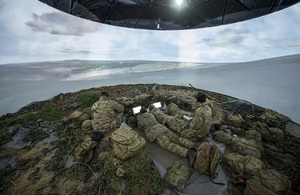DASA delivers innovation in time for Christmas
Contracts in place to support training and education across defence.

The Defence and Security Accelerator (DASA) has rapidly turned around the delivery of four commercial contracts to improve the efficiency and effectiveness of training and education across defence.
Within 48 hours of the initial customer meeting, DASA opened two new focus areas in their open call competition to engage the private sector in providing potential solutions. These innovative ideas were assessed and funding awarded within ten weeks of initial contact.
The Defence Science and Technology Laboratory (Dstl) has identified two major training challenges to maximise the effectiveness of UK forces in future operating environments. Firstly, Dstl finds that current training and education is resource intensive and limited by location, capacity and time constraints. And secondly, the proliferation of military interconnected technology and the expected escalation in the sophistication of this technology requires deep human understanding of those interactions in order to exploit the advantages.
Jyoti Hirani, Operations Lead, DASA said:
Innovation is not just about providing shiny new technologies to our front line, but can also be in the efficiencies of how we do things day-to-day within government. If one of our customers identifies a specific area as a capability gap, we can help them to hone the requirement and develop a potential solution. DASA can deliver transformative solutions quickly that can enhance and improve the operation of our government customers.
Four contracts have been placed to the value of £342,000 and each project will be working closely with Dstl from the New Year to test, trial and investigate the practicalities and potential benefits of their innovative idea. In order to deliver the contracts quickly, DASA has accelerated processes outside normal practices.
Anita Hay, Project Manager, Delivery and Innovation, Dstl said:
DASA is a mechanism to private sector engagement and we appreciate their rapid engagement in this project. Simulation training needs to be as realistic as possible as UK Forces are deployed in difficult operational environments. Giving them the best training possible with minimal inconvenience is something Dstl strives to provide.
Funding was awarded to XPI Simulations, SimCentric Limited, Vedette Consulting Limited and Transmedia Storyteller Limited, which are all small to medium sized enterprises (SMEs) or micro SMEs. For small businesses such as these DASA funding can make a real difference to their future growth and success.
XPI Simulation’s proposal “CIRRUS – Cloud Infrastructure for Rapid Rendering to Users for Simulation” is looking to develop a totally cloud hosted synthetic environment for training.
SimCentric Limited’s proposal “A simulation testbed for high fidelity human behaviour within megacities” is going to develop a simulation engine to represent the various elements of a megacity.
Vedette Consulting Limited’s proposal “Model to Optimise Simulation Mix to Deliver Efficient and Effective Training” will provide a prototype technique to support decision makers in achieving optimum training outputs matched to current and future resources.
Transmedia Storyteller Limited’s proposal “Hybrid Warfare Rehearsal Tool” will aim to deliver software that allows warfighters to rehearse hybrid warfare strategies and tactics that span influence, information and infrastructure.
Innovation Focus Areas: We are continuously open for proposals under the Open Call for Innovation Focus Areas, including ‘training and education efficiency and effectiveness challenge’ and ‘modelling and simulation representation of the future operating environment’. The next deadline for proposal submission is 3 January.